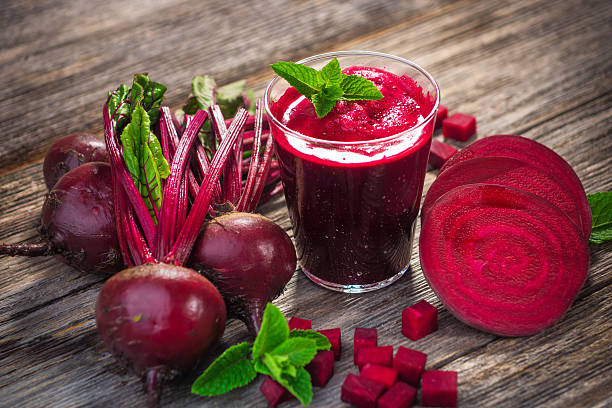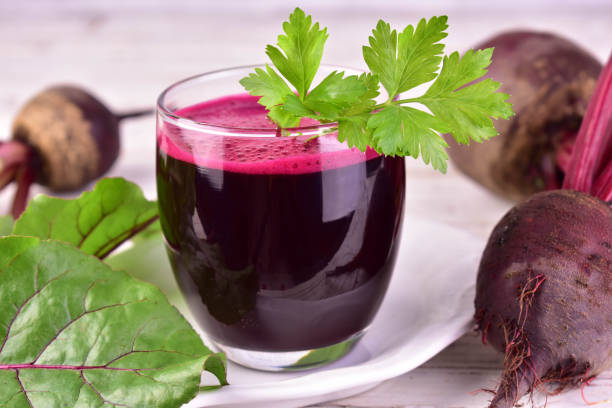Introduction More Than Just a Salad Ingredient
Beetroot a humble red vegetable often seen in salads or juice bars holds a deep secret. Its vibrant red color isn’t just eye-catching; it’s a symbol of powerful nutrients, ancient healing traditions, and modern scientific marvels. So, is beetroot just a veggie Or a glowing source of health, strength, and beauty Let’s dive into this red superfood’s depths and discover what makes it a health hero
Nutritional Profile of Beetroot What Makes It a Superfood
Beetroot is low in calories but dense in nutrients. It’s particularly high in folate, which plays a vital role in cell function and tissue growth. A cup of raw beetroot (about 136g) contains:
- 3.4 grams of fiber
- 6.7 grams of carbohydrates
- 1.7 grams of protein
- 20% of the RDI of folate
- 14% of the RDI of manganese
- 8% of the RDI of potassium
- 6% of the RDI of vitamin C
In addition, beetroot is packed with:
- Nitrates: Improve blood flow and athletic performance
- Betalains: Anti-inflammatory and antioxidant compounds
- Betaine: Supports liver health and cell function
Beetroot Through the Ages: A Healing Legacy
Ancient Civilizations
In ancient Greece, Rome, and Egypt, beetroot leaves were used to treat fever, constipation, and purify blood. The root wasn’t commonly consumed back then.
Medieval Era
Arab and European herbalists used beetroot for liver disorders and skin ailments. It was believed to remove body heat and detoxify the system.
Modern Era
By the 19th century, beetroot was used to extract sugar. Today, it’s a favorite in health, fitness, and beauty industries, hailed for its detoxifying and stamina-boosting powers.
6 Surprising Health Benefits of Beetroot

1. Boosts Blood Production and Purification
Beetroot is rich in iron and folate, essential for the formation of red blood cells. Regular consumption may help prevent anemia and promote blood purification.
2. Regulates Blood Pressure
Thanks to its natural nitrates, beetroot helps dilate blood vessels, improving blood flow and reducing blood pressure — a boon for heart health.
3. Enhances Brain Function and Focus
Beetroot increases oxygen supply to the brain, improving memory, focus, and cognitive performance. Studies show improvement in mental performance in older adults.
4. Improves Energy and Physical Endurance
Beetroot is a favorite among athletes for its nitrate content, which enhances stamina and reduces fatigue during physical workouts or long days.
5. Promotes Glowing Skin
Loaded with antioxidants, beetroot helps detoxify the skin, reduce pigmentation, and bring a natural glow from within.
6. Aids Digestion and Gut Health
Its fiber content helps improve digestion, relieve constipation and gas, and support a healthy gut microbiome.
Beetroot for Immunity and Detoxification
Beetroot is an immunity-boosting food because it is rich in vitamin C, B6, and iron. These nutrients support white blood cell production and overall immune health.
Nitrates improve blood flow.
Betalains reduce inflammation.
Folate supports cell renewal.
This nutrient combo makes beetroot a true detoxifier and immunity warrior.
Is Beetroot Beneficial for Athletes Science Says Yes
Yes, beetroot is widely recognized for enhancing athletic performance.
According to a Journal of Applied Physiology study, beetroot juice improved running performance and reduced oxygen cost during exercise.
Athletes often drink beetroot juice 90 minutes before workouts to maximize endurance.
External Link Suggestion: Read the Journal of Applied Physiology study
Can Beetroot Reduce Inflammation
Absolutely.
A study in Clinical Nutrition recognized beetroot as a potent anti-inflammatory food.
Its compounds like betalains and antioxidants help in reducing chronic inflammation — a root cause of many diseases including heart issues, arthritis, and obesity.
How Beetroot Boosts Brain Health
Beetroot increases blood flow to the brain, especially in older adults.
Research from Wake Forest University found that elderly individuals who drank beetroot juice daily showed better brain function, attention, and reaction time.
It may lower the risk of cognitive decline and dementia.
Can Beetroot Help Prevent Cancer
Beetroot contains betacyanin, which gives it its deep red color.
This compound has been shown in lab studies to slow the growth of tumor cells.
While more human research is needed, beetroot is considered a cancer-protective food due to its antioxidant and anti-inflammatory properties.
External Link Suggestion: NIH Research on Betacyanin and Cancer Prevention

When and How to Eat Beetroot for Best Results
- Morning: Best time is empty stomach for juice
- Pre-workout: Boosts stamina and energy
- As salad or boiled: Include it in daily meals
- Cooked or raw: Both forms offer unique benefits
Tip: Don’t overcook — it can reduce nitrate and vitamin content.
Common Myths About Beetroot – Busted!
Myth 1: It increases blood too much
Truth: It balances blood production, not excess.
Myth 2: Only for women
Truth: Beetroot benefits everyone — men, women, kids, and seniors.
Myth 3: Not safe for diabetics
Truth: In moderation, beetroot is safe for diabetics due to its low glycemic index.
Possible Side Effects of Beetroot
While beetroot is safe for most people, overconsumption may cause:
- Beeturia: Pink/red urine — harmless
- Kidney Stones: High oxalate content, so those prone should limit intake
- Low Blood Pressure: If you already have low BP, consume with caution
If you’re on medications or have a chronic illness, consult a doctor before regular use.
Conclusion: A Glowing Gift of Nature
Beetroot is not just a red vegetable — it’s a natural powerhouse of health, energy, and vitality. With its rich mix of nutrients, antioxidants, and medicinal properties, it shines as a superfood in both ancient remedies and modern research.
Include it smartly — whether in the form of juice, salad, or pre-workout booster — and experience its radiant impact on your body and mind.
Disclaimer
The tips and suggestions mentioned in this article are intended for general informational purposes only. Before starting any fitness program, making changes to your diet, or trying any remedies related to health conditions, please consult your doctor or a qualified healthcare professional. Dr. You does not verify or endorse the authenticity of any such claims made herein

